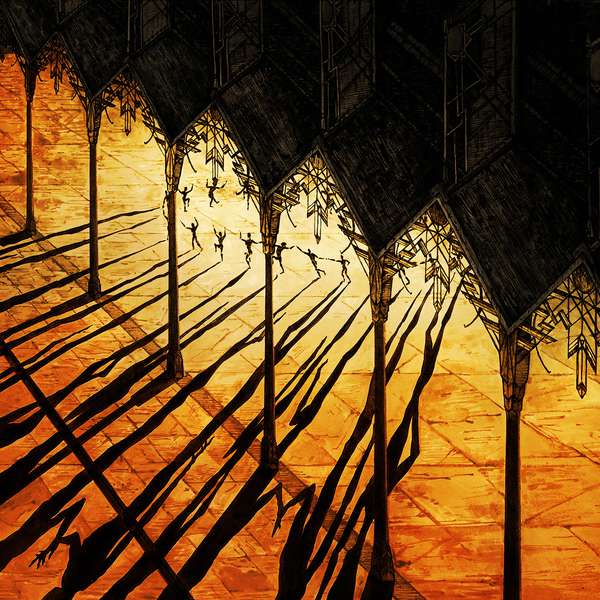The Uncanny Valley pulses in high concept waves and the mastermind behind it all, Perturbator (composer James Kent), creates visual magic with naught but a synthesiser and a slick, rain-soaked neon palette. Kent has been making music as his electronic alter-ego since at least 2012, but he started out in black metal and the Frenchman carries over similar aesthetics from the underground. Dark themes, the black church splashed across the artwork, Satanic imagery, rebelling against the “norm” and the leather clad vibe the whole project radiates links back to metal, and it’s not surprising that many fans of Perturbator are involved in that scene.
The Uncanny Valley is drenched in glossy blackness and the songs push forth with a keen ear for structure, narrative and forward thinking. The story follows on from 2014s Dangerous Days and picks up twenty four years later in the streets of Tokyo with the titular Night Driving Avenger on a mission to disassemble an underground group who have taken it upon themselves to rid the world of machines, alongside an assassin who happens to be an android. It's a huge story arc but never overwhelming and with Perturbator's physical release being accompanied by a graphic novel, depth is given to the music and it's thrilling nuances.
Neo-noir threads are held throughout and the tracks could be lifted from a whole slew of 80s retro-thrillers or video games (think Drive, Daft Punk, Blade Runner) but there’s a futuristic slant in its basslines and gorgeous leads. "Neo Tokyo" pounds into view to begin the record on strident beats while "Weapons for Children" pulses with ominous charm and The Bohren & der Club of Gore like vibe of "Femme Fatale" slinks around the corner in languid tones and opulent grace. "Sentient" is a stunning highlight and Hayley Stewart’s wonderful voice adds texture and layers to a track that is laced with a heady sensuality and seductive sadness. It’s so different to the preceding tracks that it feels like a turning point in the record and that afterwards nothing will be the same again.
The thrilling pace of “Diabolus Ex Machina” signals the beginning of the new age with “Assault” following and driving even more heavy bass into the mix along with a delicious aura of violence and melody. It’s exhilarating and leaves no room for pause; Perturbator is a deadly force and he wields these electronic sounds with precision engineering. Each beat is thought through; its effect visualised and imbued with care, while the battle rages on around us in sleek, mechanical arcs. “Souls at Zero” begins the exit with sci-fi embellished vocal lines that define a robotic identity before “The Uncanny Valley” signals finality and brings us to a resolution that will have a longstanding effect on the neon-lit city at the records core.
The Uncanny Valley is a dramatic piece of work that will reveal more of itself with each repeated listen; the subtle inflections of sound that move off each other, the small cues for emotion that sit deep under the beats and rise up in reciprocal waves, the voice given to the silent hero and his fight for acceptance - all add up to an exhilarating and powerful work of art.

James Kent, known as Perturbator, has been meticulously constructing whole worlds with his dark synthwave music, one album at a time. His love of cyberpunk concepts has been the driving force for all his releases, and coupled with a strong '80s aesthetic, he has been able to breathe life into these feverish visions of futuristic domains. The Uncanny Valley is the latest entry to this series of work, beginning 24 years after the events depicted on his previous record, Dangerous Days. What is quite interesting here, is that Kent wants the listener to experience the record by becoming the protagonist of his story, entering a world of androids and assassins, freedom fighters, underground factions and false religions aimed to control the populous.
This idea works brilliantly, and there is such a graphic element in The Uncanny Valley that makes you instantly feel part of the scenery. The mechanical electronic environment that is constructed grants a great sense of movement, making you feel as if you are rapidly exploring the back alleys of “Neo Tokyo.” It goes as far as making you feel part in some nightmare-like video game, as the melodies point you towards different directions, while scenes from Ghost In The Shell begin to creep back in your mind. The energy that these moments have is stunning, and Kent is not afraid to go even full on disco in the record, with tracks such as “Disco Inferno” and the explosive “Diabolus Ex Machina” causing the soundscapes to crumble with their primal sense of ferocity. Thundering bass lines and '80s oriented guitar solos cruise in, as frantic keys and extreme delays reveal all the nastiness of the genre.
The morphing of Pertubator changes through the record, and it is not just the energy and kinesis of electro that exists in The Uncanny Valley. More hazy moments and the acid side of the genre soon flourish. The more laid-back approach of “Weapons For Children” grants a cold touch with its retro aesthetics, while the mysterious start of “Assault” sees the synths slithering towards you. Darker and more sinister moments come to the front with “Death Squad,” causing the arrangements to morph instantly, while “She Moves Like A Knife” enters a complete hallucinogenic area. And, right there when it has gotten you to the lowest point, Kent makes use of the emotional side of electro, offering more catchy and intoxicating tracks, such as “Venger.” Completely lost in the vocals of Greta Link, Pertubator unveils the tech-noir touch that influences his worlds.
Trapped in the world of Blade Runner, that notion becomes clearer as “Femme Fatale” is introduced, with the stunning sax playing, it feels as if you find yourself in dark, cyber bar of a futuristic Sin City with a soundtrack composed by Kilimanjaro Darkjazz Ensemble. Even though the extent to which Kent travels into the noir territory with “Femme Fatale” is not repeated, there are still instances where that side merges more closely with the electro tone. “Sentient” is such an example, appearing as an all-devouring abyss with Hayley Stewart's vocals coming across brilliantly and stealing the show.
The allure of the noir style is not the only experimentation of the album, and even though there is a quite maximalistic perspective, Kent still takes a walk towards more abstract domains. “Souls At Zero” sees the bleak cyberspace expanding and getting more dim by each second, while the stunning progression of the title track follows a similar path, but with a bit more emotion. It is also apparent that certain of the melodic parts of the album, and a few of the more majestic moments are influenced by the black metal side of Kent, who was a guitar player for such acts in the past.
The Uncanny Valley was named after a hypothesis in robotics engineering. A phenomenon that occurs when a robot resembling, nearly identically the human form, causes a response of revulsion to the human observer. This is not the case with listening to The Uncanny Valley. There is not a single moment that can make you look away.



